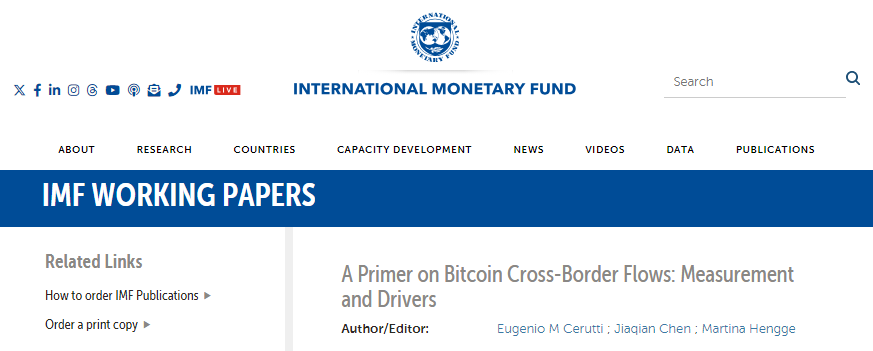During financial instability and tough restrictions in countries such as Argentina and Venezuela, people have looked to Bitcoin as a means of survival. The International Monetary Fund (IMF) explores how locals are utilizing Bitcoin as an alternative financial tool, conducting transactions beyond the reach of capital controls outside the blockchain network.
In difficult economic situations, cryptocurrencies demonstrate their strength and flexibility by allowing individuals to achieve financial independence.
The International Monetary Fund (IMF) has published an enlightening report named “Bitcoin: A Guide to Global Transfers.” This document highlights Bitcoin’s growing importance as a medium for cross-border financial transactions on a global scale.

Understanding The Dynamics Of Bitcoin Transactions
An intriguing connection between Bitcoin activity and standard economic measures is revealed in the report. Surprisingly, elements unique to cryptocurrencies like market instability and investor mood carry more weight in shaping Bitcoin transactions compared to traditional signals.
Cryptocurrencies may provide an alternative way to protect against traditional financial hazards due to their distinct growth patterns. They offer people and organizations a fresh method to reduce risk through diversification.

Navigating Regulatory Challenges In The Crypto Landscape
In the IMF’s assessment, Bitcoin holds great promise for facilitating global commerce and financial access. However, the report issues a warning about the need for effective regulation due to the anonymous nature of cryptocurrency transactions. This anonymity increases the risk of these funds being used for criminal activities like money laundering.
Therefore, the report emphasizes the need for international coordination to create unified rules and regulations for cryptocurrency deals, ensuring risk reduction and providing a safe platform for such transactions.
The need for thorough cryptocurrency regulation is being voiced out globally as authorities strive to manage the intricacies of monitoring a rapidly developing financial system. Transparent and well-defined regulations not only minimize the risks linked to Bitcoin and other digital currencies but also establish a more foreseeable and steady financial landscape.
Regulators can promote both advancements and protection in the cryptocurrency sector by finding the right equilibrium. This approach allows the industry to flourish while minimizing risks.
Embracing The Potential Of Bitcoin
With Bitcoin’s growing impact on world finance, the IMF’s report acts as a relevant caution for the pros and cons of cryptocurrencies. Bitcoin offers significant advantages in simplifying cross-border transactions and expanding financial accessibility. However, it is crucial to implement suitable regulations to minimize risks and protect the stability of the financial market.
Policymakers can seize the opportunities that Bitcoin and other cryptocurrencies offer by tackling regulatory issues head-on. In doing so, they can utilize the innovative capabilities of these digital currencies to build a more diverse and robust economic system on a global scale.
Read More
- SOL PREDICTION. SOL cryptocurrency
- LUNC PREDICTION. LUNC cryptocurrency
- BTC PREDICTION. BTC cryptocurrency
- USD ZAR PREDICTION
- USD CLP PREDICTION
- VANRY PREDICTION. VANRY cryptocurrency
- IQ PREDICTION. IQ cryptocurrency
- ASTO PREDICTION. ASTO cryptocurrency
- EUR RUB PREDICTION
- RBX PREDICTION. RBX cryptocurrency
2024-04-24 14:41